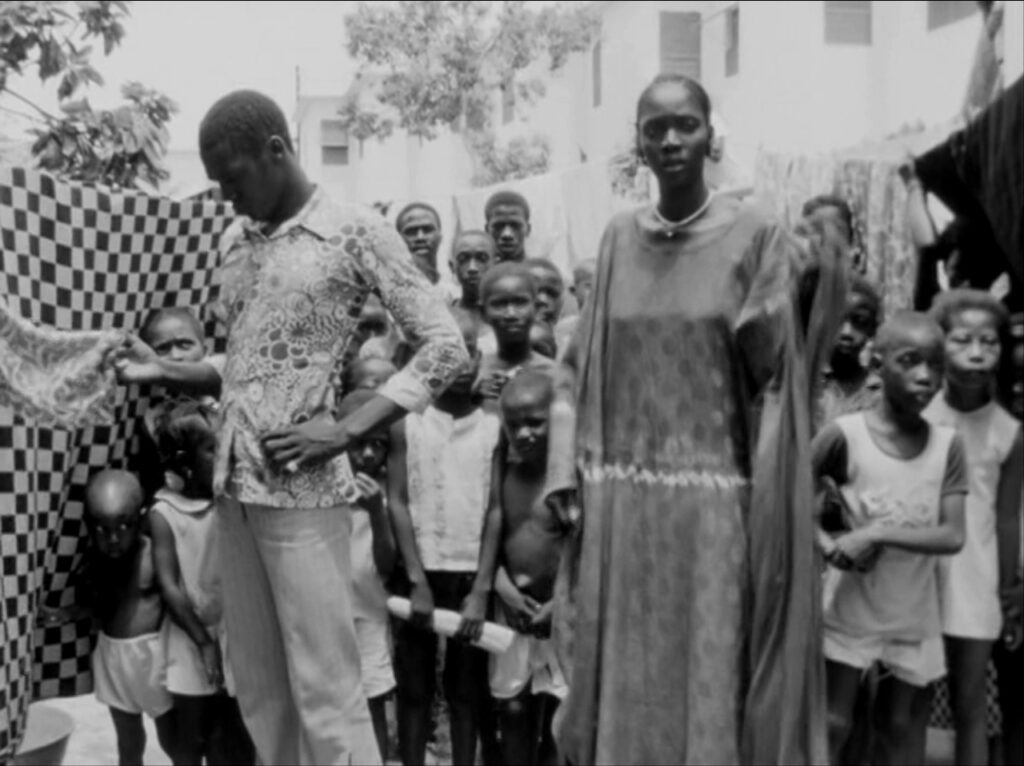(Photo above is from MOSSANE, 1996)
UPDATE March 9, 2023: We received a prompt response from Arsenal (Arsenal – Institut für Film und Videokunst e.V.), the German distributor (and only distributor) entrusted with much of Faye’s body of work:
“We are indeed the distributors of Safi Faye’s films and we had a very trustful relationship. Some we have digital, some only as analog prints. And we have the rights for cinematic screenings, not for streaming. Safi Faye was against the streaming of her work. At the moment I wait to negotiate with the heir of Safi Faye’s work, but this may take some time.”
In summary, Faye’s films likely will not be widely accessible anytime soon; certainly not streaming. But the work is being done to get there. No ETA at this time.
Arsenal is aware that there are copies of a few of her films on video-sharing platforms like YouTube, but, as stated in the earlier item below, these aren’t authorized, and attempts are being made to have them removed.
In the meantime, screening inquiries of Faye’s films (primarily for festivals, screening series, schools, etc) should be directed to them.
We will stay in touch with Arsenal, and, as any new info arises, we will share.
Below is the original March 8, 2023 article.
It’s a question I’ve been asked repeatedly since news of her death was reported two weeks ago: “Where can I watch Safi Faye’s films?”
It seems inconceivable that the films of a filmmaker whose pioneering work, documented as the first Sub-Saharan African woman to direct a commercially distributed feature film, placing women at the center of her stories, are inaccessible. Faye died two weeks ago, on February 22, in Paris, France. Obituaries, celebrations, and contextualization of her life and work abound. But there’ve been very few inquiries into the whereabouts of her films, which remain woefully underseen and thus underappreciated, and even fewer answers; unless you were lucky enough to catch a screening at a local film festival, screening series, or college campus.
Despite her extensive work and accomplishments, Faye’s name is still relatively unknown, especially when compared to other women cinema pioneers — Agnès Varda, as one example.
Additionally, Faye is rarely included on lists of prominent (and all male) African filmmakers the likes of Ousmane Sembène, Djibril Diop Mambéty, Med Hondo, Paulin S. Vieyra, and others. If Sembène is referred to as the “father of African cinema,” Faye, for all intents and purposes, should then be the “mother of African cinema.” And like Sembène’s films, Faye’s ought to be just as broadly acknowledged, and that starts with making them widely accessible.

Here at Akoroko, an ongoing initiative is to raise awareness (especially in North America) of underappreciated African films we deem essential to understanding the African cinema timeline, linking past and present. We’ve been on the hunt for English-subtitled versions of Faye’s most notable films — including MOSSANE (1996) and her debut KADDU BEYKAT (1976) — since the news of her death. We’re pursuing a few leads that should eventually provide answers.
But, prompted by International Woman’s Day, today, March 8, 2023, as well as questions about how to see Faye’s films, we are opening up the process.
Currently, none of her films appear to be commercially available in any format; especially for English-language territories: VHS, DVD, Bluray, or streaming. Even trailers for each film are impossible to find, as are video interviews with Faye; except for the conversation embedded at the bottom of this post, although it’s in French without English subtitles.
There is a German distributor (Arsenal) with a library of a few Faye titles, including the aforementioned MOSSANE and KADDU BEYKAT. We’ve reached out to them, hoping a response is forthcoming.
Additionally, Faye apparently owned a collection of her films, likely because their initial distribution was poorly handled.
Faye left behind a daughter, and it’s possible that she’s now in charge of her mother’s estate. We’re working to make contact.
In the meantime, as one would expect, there are copies of both MOSSANE and KADDU BEYKAT online (with English subtitles), which are likely not authorized, and certainly not the most ideal way to watch each film. But this is what lack of access begets (for better and for worse); especially now that Faye has died, resulting in an increase in curiosity about her work.
But I won’t share those likely unauthorized copies here.
Stay tuned… It’s certainly possible that others are pursuing answers to the question posed in the title of this post, which will be updated as more information is received. Email info@akoroko.com if you have any further insight.
Filmography: 1972 LA PASSANTE (THE PASSERBY); 10 min. | 1976 KADDU BEYKAT (LETTER FROM MY VILLAGE); 97 min. | 1979 FAD’JAL (COME AND WORK Come); 113 min. | GOOB NA NU (THE HARVEST IS IN); 29 min. | 1980 MAN SA YAY (I, YOUR MOTHER); 59 min. | 1981 LES ÂMES AU SOLEIL (SOULS UNDER THE SUN); 27 min. | 1982 SELBE ET TANT D’AUTRES (SELBE: ONE AMONG MANY); 32 min. | 1985 RACINES NOIRES (BLACK ROOTS) | 1989 TESITO; 30 min. | 1996 MOSSANE; 106 min.
